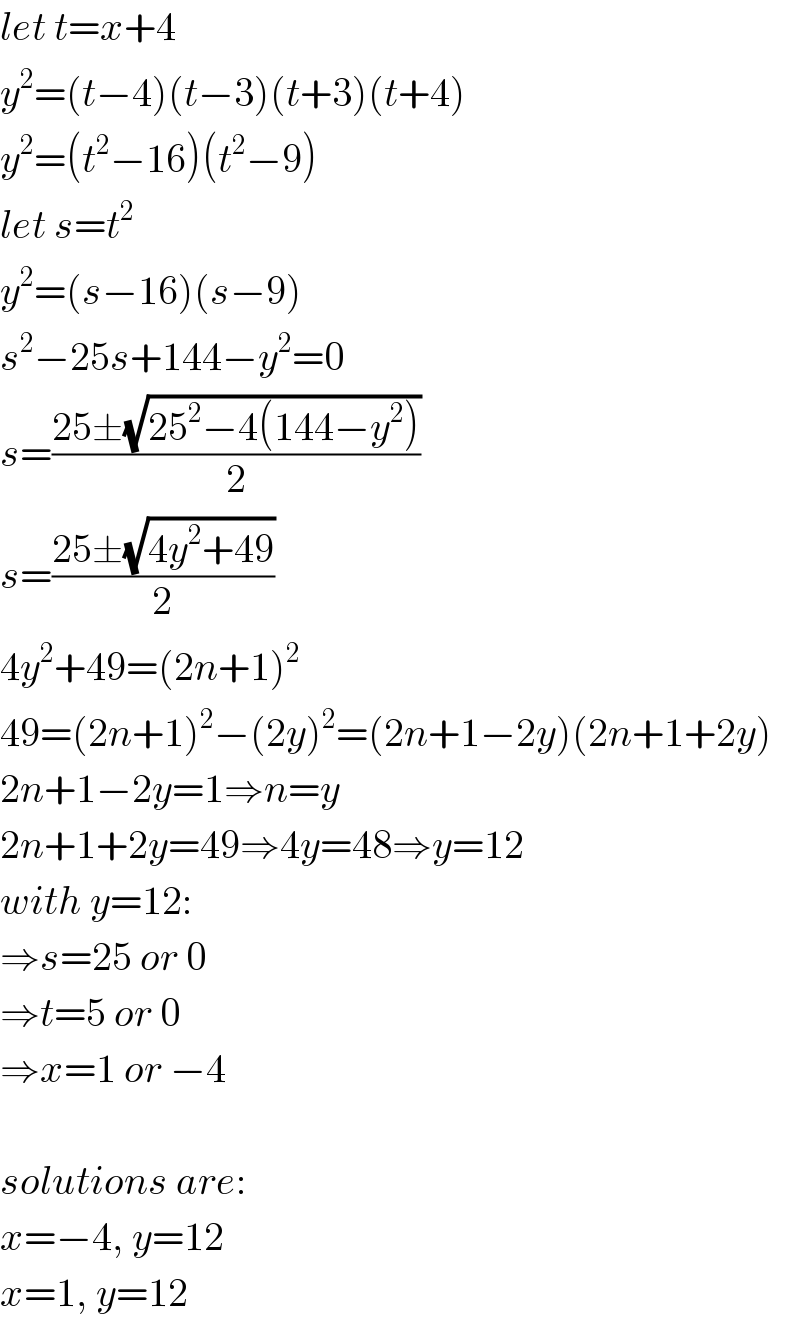
Question Number 50369 by prof Abdo imad last updated on 16/Dec/18

$${find}\:{x}\:,{y}\:{from}\:{Z}\:\:{wich}\:{verify} \\ $$$${y}^{\mathrm{2}} ={x}\left({x}+\mathrm{1}\right)\left({x}+\mathrm{7}\right)\left({x}+\mathrm{8}\right) \\ $$
Answered by mr W last updated on 16/Dec/18

$${let}\:{t}={x}+\mathrm{4} \\ $$$${y}^{\mathrm{2}} =\left({t}−\mathrm{4}\right)\left({t}−\mathrm{3}\right)\left({t}+\mathrm{3}\right)\left({t}+\mathrm{4}\right) \\ $$$${y}^{\mathrm{2}} =\left({t}^{\mathrm{2}} −\mathrm{16}\right)\left({t}^{\mathrm{2}} −\mathrm{9}\right) \\ $$$${let}\:{s}={t}^{\mathrm{2}} \\ $$$${y}^{\mathrm{2}} =\left({s}−\mathrm{16}\right)\left({s}−\mathrm{9}\right) \\ $$$${s}^{\mathrm{2}} −\mathrm{25}{s}+\mathrm{144}−{y}^{\mathrm{2}} =\mathrm{0} \\ $$$${s}=\frac{\mathrm{25}\pm\sqrt{\mathrm{25}^{\mathrm{2}} −\mathrm{4}\left(\mathrm{144}−{y}^{\mathrm{2}} \right)}}{\mathrm{2}} \\ $$$${s}=\frac{\mathrm{25}\pm\sqrt{\mathrm{4}{y}^{\mathrm{2}} +\mathrm{49}}}{\mathrm{2}} \\ $$$$\mathrm{4}{y}^{\mathrm{2}} +\mathrm{49}=\left(\mathrm{2}{n}+\mathrm{1}\right)^{\mathrm{2}} \\ $$$$\mathrm{49}=\left(\mathrm{2}{n}+\mathrm{1}\right)^{\mathrm{2}} −\left(\mathrm{2}{y}\right)^{\mathrm{2}} =\left(\mathrm{2}{n}+\mathrm{1}−\mathrm{2}{y}\right)\left(\mathrm{2}{n}+\mathrm{1}+\mathrm{2}{y}\right) \\ $$$$\mathrm{2}{n}+\mathrm{1}−\mathrm{2}{y}=\mathrm{1}\Rightarrow{n}={y} \\ $$$$\mathrm{2}{n}+\mathrm{1}+\mathrm{2}{y}=\mathrm{49}\Rightarrow\mathrm{4}{y}=\mathrm{48}\Rightarrow{y}=\mathrm{12} \\ $$$${with}\:{y}=\mathrm{12}: \\ $$$$\Rightarrow{s}=\mathrm{25}\:{or}\:\mathrm{0} \\ $$$$\Rightarrow{t}=\mathrm{5}\:{or}\:\mathrm{0} \\ $$$$\Rightarrow{x}=\mathrm{1}\:{or}\:−\mathrm{4} \\ $$$$ \\ $$$${solutions}\:{are}: \\ $$$${x}=−\mathrm{4},\:{y}=\mathrm{12} \\ $$$${x}=\mathrm{1},\:{y}=\mathrm{12} \\ $$
Commented by maxmathsup by imad last updated on 16/Dec/18

$${thank}\:{you}\:{sir}\:{for}\:{this}\:{hardwork}. \\ $$
Commented by Necxx last updated on 17/Dec/18

$${please}\:{why}\:{did}\:{you}\:{equate}\:\mathrm{4}{y}^{\mathrm{2}} +\mathrm{49}=\left(\mathrm{2}\boldsymbol{{n}}+\mathrm{1}\right)^{\mathrm{2}} ??? \\ $$
Commented by mr W last updated on 17/Dec/18

$${s}=\frac{\mathrm{25}\pm\sqrt{\mathrm{4}{y}^{\mathrm{2}} +\mathrm{49}}}{\mathrm{2}} \\ $$$${such}\:{that}\:{s}\:{is}\:{integer}, \\ $$$$\sqrt{\mathrm{4}{y}^{\mathrm{2}} +\mathrm{49}}\:{must}\:{be}\:{an}\:{odd}\:{integer},\:{say} \\ $$$$\mathrm{2}{n}+\mathrm{1},\:{therefore} \\ $$$$\mathrm{4}{y}^{\mathrm{2}} +\mathrm{49}=\left(\mathrm{2}{n}+\mathrm{1}\right)^{\mathrm{2}} \\ $$
